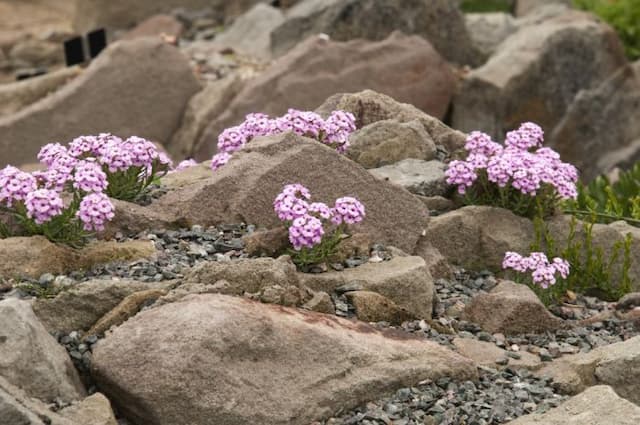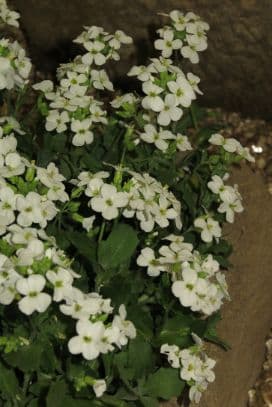Perennial honesty Lunaria rediviva

ABOUT
L. rediviva is an herbaceous perennial to 90cm tall, with toothed, triangular-heart-shaped leaves and panicles of fragrant, lilac-white flowers 2.5cm wide in spring and early summer, followed by elliptical seedheads useful for drying
About this plant
 Names
NamesFamily
Brassicaceae
Synonyms
Perennial Honesty, Perpetual Honesty, Money Plant
Common names
Crucifera lunaria E.H.L.Krause, Lunaria latifolia Mill., Lunaria spicata Lam.
 Characteristics
CharacteristicsLife cycle
Perennials
Foliage type
Deciduous
Color of leaves
Green
Flower color
Purple
Height
3 feet (0.91 meters)
Spread
1 foot (0.30 meters)
Plant type
Herb
Hardiness zones
4
Native area
Europe
Benefits
 General Benefits
General Benefits- Aesthetic beauty: Lunaria rediviva, commonly known as perennial honesty, produces delicate, fragrant flowers that add beauty to gardens and attract pollinators.
- Habitat for wildlife: The plant serves as a habitat for various species of insects, providing them with nectar and a place to live.
- Low maintenance: Perennial honesty is known for being a hardy plant that requires minimal care once established, making it ideal for gardeners of all skill levels.
- Drought resistance: It can withstand periods of drought, which is beneficial in regions with water scarcity or for gardeners aiming for low-water-use landscapes.
- Erosion control: With its root system, it can help stabilize soil and prevent erosion, especially on slopes or in areas prone to soil degradation.
- Seasonal interest: The plant's seed pods have a unique, translucent quality that many find appealing, especially when backlit by the sun in the autumn and winter months.
- Wildlife food source: The seeds of perennial honesty are eaten by some bird species, providing them with a crucial food source.
- Historical interest: It has been historically cultivated, so planting Lunaria rediviva can be a nod to traditional gardening practices and heritage varieties.
- Garden variety: The plant adds diversity to plantings, thus contributing to a more varied and resilient garden ecosystem.
 Medical Properties
Medical Properties- Diuretic: Lunaria rediviva has been traditionally used to promote the production and flow of urine.
- Expectorant: It may help in expelling phlegm from the lungs and treat respiratory conditions.
- Anti-inflammatory: The plant is associated with reducing inflammation.
- Antiseptic: Lunaria rediviva could be used for cleansing wounds and preventing the growth of bacteria.
- Emollient: The leaves may have soothing properties for the skin.
 Air-purifying Qualities
Air-purifying QualitiesThis plant is not specifically known for air purifying qualities.
 Other Uses
Other Uses- Perfume Industry: Lunaria rediviva, also known as perennial honesty, emits a strong fragrance from its flowers, which is sometimes used in formulating perfumes and scented products.
- Ornamental Crafting: The translucent seed pods of Lunaria rediviva are often dried and used in floral arrangements and crafts for their unique, silvery appearance.
- Garden Design: Perennial honesty is used in garden design for its attractive foliage and ability to provide a naturalistic, woodland aesthetic to landscapes.
- Biological Studies: Lunaria rediviva can be used as a subject in botanical studies due to its interesting seed dispersal mechanism and growth habits.
- Educational Tool: This plant serves as an educational example in botany classes to illustrate the life cycle of angiosperms and the development of seed pods.
- Liturgical Symbolism: The plant's coin-like seed pods have been used in religious teachings and ceremonies to represent money or prosperity.
- Art Supplies: Artists sometimes incorporate the unique seed pods into their work, either by painting them or using them directly in mixed media art.
- Eco-Friendly Confetti: The flat, disc-shaped seed pods can serve as an environmentally friendly alternative to traditional confetti at celebrations.
- Dyer's Plant: Although not common, the plant can be used to obtain a light-green dye for fabric, stemming from its foliage.
- Moth Deterrent: The fragrant flowers of Lunaria rediviva are thought to naturally repel moths when placed in wardrobes or drawers, although its effectiveness is anecdotal.
Interesting Facts
 Feng Shui
Feng ShuiThe Lunaria rediviva, commonly known as "Honesty," is not used in Feng Shui practice.
 Zodiac Sign Compitability
Zodiac Sign CompitabilityThe Honesty is not used in astrology practice.
 Plant Symbolism
Plant Symbolism- Honesty: Lunaria rediviva, commonly known as honesty, symbolizes transparency and truthfulness due to the transparent nature of its seed pods after they mature and dry.
- Money: Its common name in some regions, "Money Plant," and its seed pods resembling coins, associate it with wealth and monetary success.
- Perseverance: The plant is hardy and able to grow in challenging conditions, making it a symbol of the ability to persist through adversity.
- Eternal Life: Lunaria rediviva is a perennial plant, coming back year after year, which symbolizes renewal, rebirth, and the cycle of life.
- Attraction: The plant's fragrant flowers can also symbolize allure and the power of attraction because of their capacity to draw in people and pollinators alike.
 Water
WaterPerennial honesty (Lunaria rediviva) prefers consistent moisture but well-drained soil. Water the plant deeply once a week, providing approximately 1 to 1.5 gallons of water at each session, depending on the size of the plant and environmental conditions. During the growing season in spring and summer, ensure that the soil remains moist but not soggy. Reduce watering frequency in the fall and winter when the plant is dormant, tailoring it to prevent the soil from drying out completely. Always check the top inch of soil for dryness before watering again to avoid overwatering.
 Light
LightPerennial honesty (Lunaria rediviva) thrives best in partial shade to full sun conditions. It is best to place the plant where it can receive morning sunlight and afternoon shade, as harsh midday sun can be too intense. An ideal spot would offer bright, indirect light, ensuring the plant gets sufficient illumination without experiencing leaf scorch from excessive exposure.
 Temperature
TemperaturePerennial honesty (Lunaria rediviva) is hardy in a wide range of temperatures and can tolerate a minimum temperature of around 0 degrees Fahrenheit. It can withstand low temperatures during winter dormancy but prefers the warmth of spring and summer for optimal growth. The ideal temperature range for this plant is between 60 to 75 degrees Fahrenheit.
 Pruning
PruningPerennial honesty (Lunaria rediviva) should be pruned to remove any dead or damaged foliage and to maintain its shape. Prune in late winter or early spring before new growth begins. Cutting back the plant after it has flowered can encourage a second bloom and prevent excessive self-seeding.
 Cleaning
CleaningAs needed
 Soil
SoilPerennial honesty (Lunaria rediviva) thrives in moist, well-draining soil with a rich organic content. A mix containing leaf mold, compost and loamy soil works well. Ideally, maintain a soil pH between 6.0 and 7.5 to support healthy growth.
 Repotting
RepottingPerennial honesty (Lunaria rediviva) usually does not require frequent repotting and can be done every 2-3 years or when it outgrows its current container.
 Humidity & Misting
Humidity & MistingPerennial honesty (Lunaria rediviva) prefers a moderate humidity environment, typically the average room humidity level, without needing special humidity adjustments.
 Suitable locations
Suitable locationsIndoor
Provide bright, indirect light and cool temps for indoor Perennial honesty.
Outdoor
Plant Perennial honesty in partial shade and moist, fertile soil.
Hardiness zone
4-8 USDA
 Life cycle
Life cyclePerennial honesty (Lunaria rediviva) begins its life as a seed, which upon germinating in spring, develops into a rosette of leaves. The plant then grows a deep taproot and foliage in its first season. In the second year, it produces upright stems with heart-shaped leaves and fragrant, pale purple flowers in late spring to early summer. After pollination, typically by bees, the flowers develop into flat, round seed pods that mature by late summer. Once the seed pods dry and become silvery, they disperse seeds for the next generation. Perennial honesty then dies back in winter to re-emerge from its root system the following spring.
 Propogation
PropogationPropogation time
Spring to early summer
The most popular method of propagating Lunaria rediviva, commonly known as perennial honesty, is by seed. The best time to sow Lunaria rediviva seeds is either in the fall or early spring. Propagation by seeds starts with collecting the seed pods after they have dried on the plant. These pods can be gently crushed to release the seeds. The seeds should be sown into a well-draining soil mix, either in pots or directly in the ground where they are to grow, at a depth of about 1/4 inch (0.6 centimeters). It is crucial to maintain a consistent level of moisture without overwatering until germination, which typically occurs within two to three weeks in the right conditions. Once seedlings are robust enough, they can be transplanted to their final positions, ensuring they have enough space to develop fully.



![Aubrieta [Axcent Light Blue]](/_next/image?url=https%3A%2F%2Fplants-admin.emdemapps.com%2Fimages%2Fplants%2F%2Fimages%2F604b5e7128866.png&w=640&q=75)





